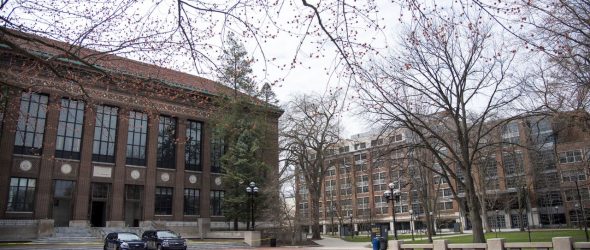ANN ARBOR, MI – Police stood guard Saturday on the University of Michigan Diag to make sure cannabis enthusiasts wouldn’t gather to celebrate Hash Bash, which was being held online to help limit the spread of coronavirus.
The in-person celebration was postponed to the fall, but organizers streamed a remote event on Facebook in response to Gov. Gretchen Whitmer’s “stay home” order to slow the spread of COVID-19.
‘Stay home and smoke your joint.’ Hash Bash goes digital amid coronavirus outbreak
Police said a handful of people who approached the Diag on Saturday afternoon may have intended to gather for Hash Bash, but complied when officers asked them to disperse.
A lengthy lineup of cannabis activists spoke via the livestream, including former Detroit Red Wing Darren McCarty, who has often spoken out about how cannabis helped him overcome addiction. The four-time Stanley Cup winner long suffered from alcoholism and other dependencies, and has been in recovery since Nov. 11, 2015, with the help of cannabis, he previously told The Ann Arbor News.
“I retired in ’09 and I got lost in that abyss,” McCarty said Saturday on the livestream. “What I want people to realize is that you have an ability now to get involved. Get educated. Learn that you have an option like I did. Go on this journey. A lot of us that are here, we know this stuff, but we are responsible in how we move forward.”
The full livestream, which includes musical performances, can be viewed here.
U.S. Rep. Debbie Dingell, D-Dearborn, who said she’s been isolated indoors for 21 days, argued that the federal government should remove marijuana from a Schedule 1 of the Controlled Substances Act. The U.S. Drug Enforcement Administration identifies Schedule 1 drugs as substances or chemicals “defined as drugs with no currently accepted medical use and a high potential for abuse.”
“It’s time we start looking at this issue in many ways,” Dingell said during the Hash Bash livestream. “People don’t understand how the business is being conducted. We need to get more research done.”
Thomas Lavigne, an attorney of the Cannabis Counsel law firm, which specializes in marijuana advocacy and regulatory compliance, said the coronavirus pandemic is shedding light on a “defective health care system.”
“In these amazingly earth-shifting times, I think we can all learn … the huge obstacles we overcame to legalize this natural resource. Now, we face this pandemic and we can draw from that strength, from that togetherness, from that brotherhood and sisterhood that we have,” Lavigne said.
Gus Rosania, UM professor of pharmaceutical sciences, said access to cannabis during the pandemic should be an “essential component of the coronavirus response.”
“We’re definitely ahead of the curve here,” Rosania said. “I do believe that the situation would be far worse today if patients did not have this option of accessing … cannabis treatment. It’s a great thing that the cannabis community can keep operating.”
“If the state gets serious and we in the cannabis community get serious, this would be an opportunity to start planting large-scale cannabis hemp crops in Michigan, whether it’s under a research umbrella or commercial umbrella.”
Hash Bash has been an Ann Arbor tradition since 1972.
The massive annual gathering of cannabis advocates saw its largest crowd ever last year, when over 10,000 people swarmed the Diag for the first Hash Bash after recreational use was legalized in Michigan.
More on the history of Hash Bash and marijuana activism in Ann Arbor here.
MLive photographer Jenna Kieser contributed to this report.
Where to pick up marijuana curbside in Ann Arbor
Inside the Ann Arbor bakeries where cannabis edibles are made
The science of weed: Ann Arbor lab makes sure dispensaries sell high-quality bud
Cannabis culture in Ann Arbor at an all-time high ahead of 48th Hash Bash
Where to pick up marijuana curbside in Ann Arbor
Ann Arbor offers tips for using Border-to-Border Trail, parks during virus outbreak
‘Welcome to Commie High’ showing online as fundraiser for Ann Arbor Film Festival
The world needs healing, psychedelic drug advocates tell Ann Arbor council


